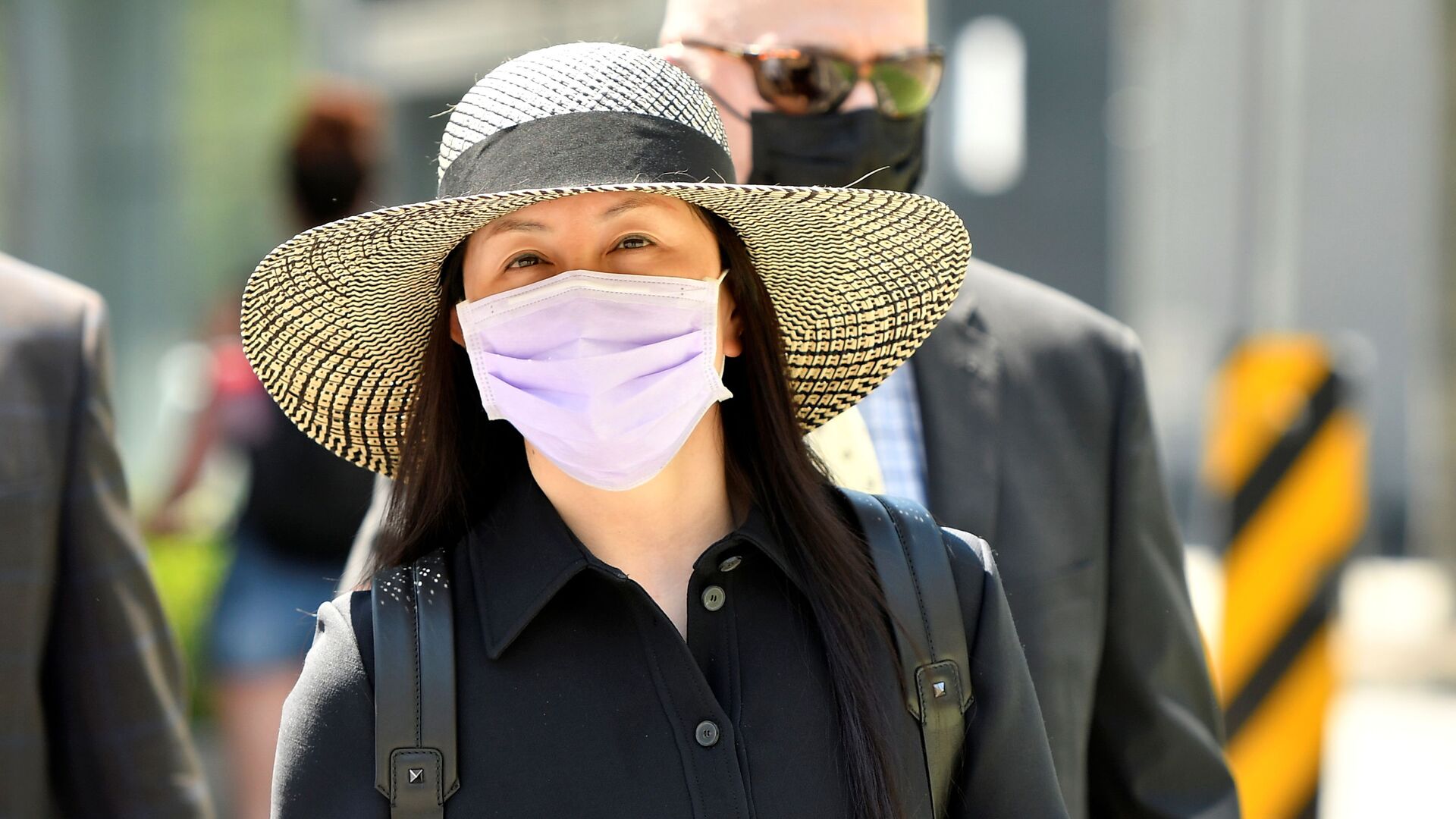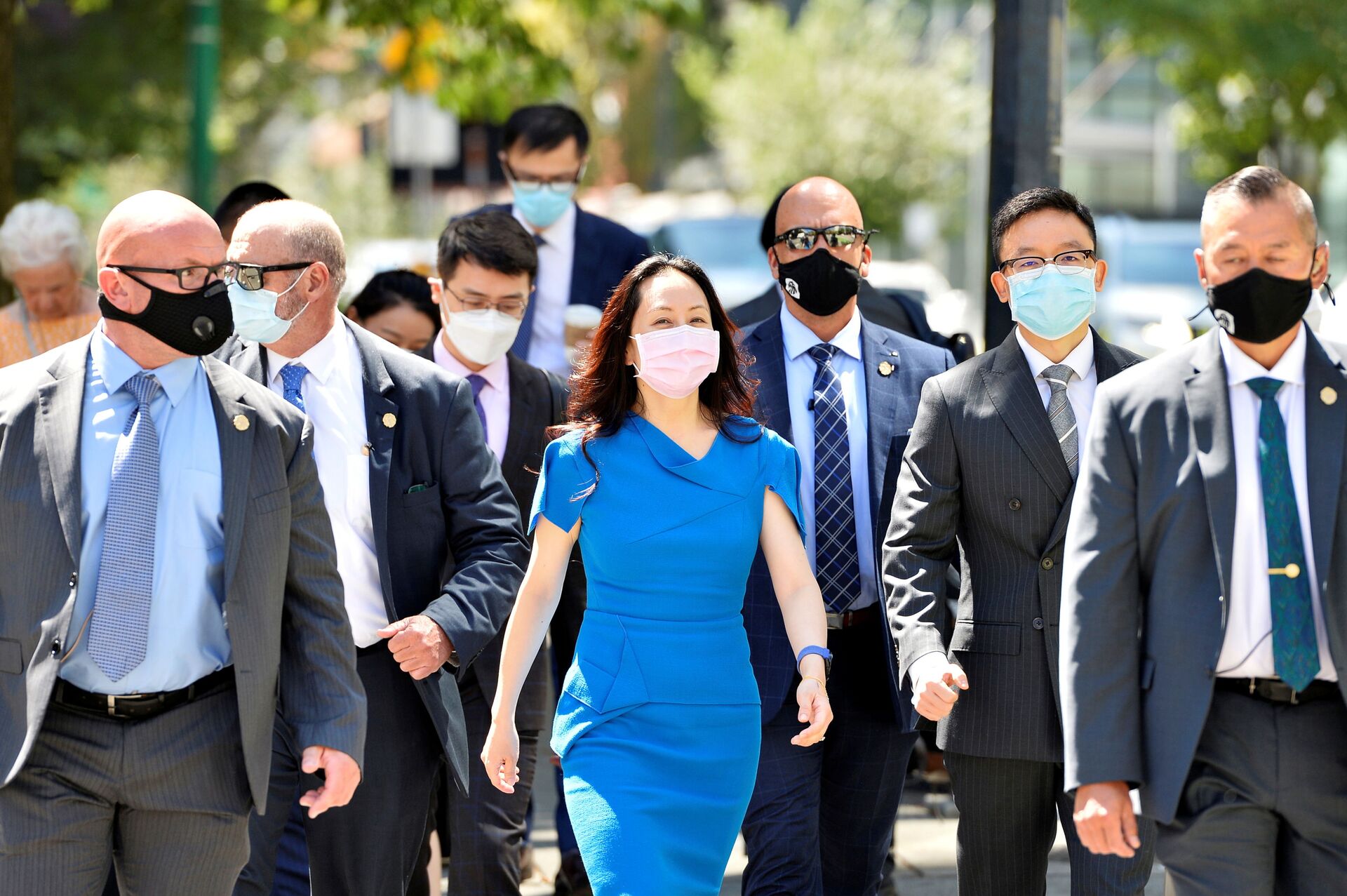Canadian Prosecutor Says No One Received ‘Fairer’ Hearing Than Huawei CFO Meng
23:45 GMT 10.08.2021 (Updated: 13:36 GMT 06.08.2022)

© REUTERS / JENNIFER GAUTHIER
Subscribe
TORONTO (Sputnik) - The extradition process against Huawei CFO Meng Wanzhou could not be any fairer, Crown attorney Robert Frater told a British Columbia Supreme Court judge, rejecting a defense appeal to end the proceedings.
The final arguments in the nearly 19-month extradition process against the Huawei executive continued Tuesday, with lawyers representing the Attorney General of Canada (AGC), on behalf of the United States, making the case before Associate Justice Heather Holmes that the Huawei executive’s defense is a concoction of mostly baseless assertions, at times loosely held together by "conspiracy theories."
Meng’s legal team, at more than half a dozen lawyers, is arguing that the United States’ bid to have her extradited south of the border to face justice for fraud charges should be denied because she is the victim of an abuse of process.
This defense is based on four components which say that the sum of former US President Donald Trump’s comments, procedural errors during the executive’s arrest, and a misleading case built by US prosecutors, one of which allegedly violates international law, amounts to an abuse of process.
"Our general position on this [case] is: One, there is no misconduct to accumulate and, two, none for impugned conduct, by itself or added to any other conduct, would justify a stay," Frater said in the court on Tuesday, emphasizing that "no person sought has enjoyed a fairer hearing than Ms. Meng."
The lead legal counsel for the Canadian government argued that the defense has "greatly" exaggerated Trump’s words and that if those words infringed on Meng’s Charter right to a fair trial, then a stay of the extradition process should have been pursued immediately, based solely on the former president’s comments.
Throughout the proceedings, Meng’s legal counsel has placed particular emphasis on Trump’s December 2018 interview with Reuters – conducted just days following Meng’s arrest – in which he asserted that he would intervene in the case brought forward by the Justice Department against Meng, if it was beneficial to US national interests.

Huawei Technologies Chief Financial Officer Meng Wanzhou returns to court following a break in Vancouver, British Columbia, Canada, August 4, 2021. REUTERS/Jennifer Gauthier
© JENNIFER GAUTHIER
On Monday, Meng’s chief legal representative, Richard Peck, said Trump’s comments indicated that he wanted to "ransom" Meng in exchange for China’s capitulation in trade negotiations between Washington and Beijing.
Frater rejected Peck’s assertions, saying that Trump’s words did not represent a threat, while noting that the Biden administration has stayed the course regarding the extradition process.
"We gave you the words of the current President and the current Attorney General, which show that a forward-looking remedy, which abuse of process is, is unnecessary," the crown attorney said.
Frater also dismissed claims that Meng's Charter rights were violated by Canadian authorities during her three-hour detention at Vancouver’s international airport and claims that the arrest process was riddled with procedural errors, which forms the basis for the second branch of the abuse of process assertion.
The prosecutor said that out of the 34 allegations of misconduct brought forward by the defense, only one can be classified as an error, which itself caused "no prejudice to Ms. Meng."
During the arrest at Vancouver’s International Airport, Canadian Border Services Agency (CBSA) agents sealed the executive’s mobile devices in special bags designed to prevent remote wiping and transferred the bags to the Royal Canadian Mounted Police (RCMP), but not before a border agent obtained passcodes to the phones from Meng and placed them in the bags.
Canadian Justice Department lawyers have argued that there is no evidence Canadian law enforcement officials turned over information about Meng’s electronic devices to the FBI. Frater added that border screening measures do not afford individuals the right against self-incrimination, suggesting, citing relevant case law, that the passcode transfer does not represent a breach of the law.
The Canadian prosecution’s top attorney also rallied against insinuations that Canadian police and border agents were acting at the behest of US law enforcement agencies when the procedural errors were committed. In the early phase of the hearings, lawyers for the Huawei executive argued that the arrest and the misconduct were part of a "covert investigation" targeting Meng.
"The US-led conspiracy theory was needed as the glue to hold together the second branch abuse argument, without it that argument falls apart," Frater said.
Meng, the daughter of the Huawei founder and CEO, Ren Zhengfei, was arrested at the request of the US government on December 1, 2018, at Vancouver International Airport, during a layover stop.
The US Justice Department alleges that Meng committed fraud by misleading banking giant HSBC into approving more than $100 million in transactions that contravened US sanctions on Iran from 2010 to 2014 through a Tehran-based shell company, Skycom.
Meng remains under house arrest in Vancouver, although she is free to traverse the region in the company of state-imposed guards, and only outside of her 11:00 p.m to 6:00 a.m. curfew.
Final arguments are expected to wrap up August 20 with committal hearings, where the judge will decide whether to proceed with the extradition request, set to begin on Wednesday.
Holmes is expected give her recommendation on the United States’ extradition request to AGC and Justice David Lametti later in the fall. Lametti has the final say on the request and has the right to refuse extradition in exceptional circumstances.
Analysts say Lametti’s decision could hinge on developments in China, where the fate of multiple Canadians is held in the balance.
On Tuesday, Canadian state broadcaster CBC reported that a Chinese court upheld a death penalty for Canadian Robert Schellenberg for drug smuggling. Additionally, two Canadians, who Ottawa alleges are being held in retaliation for Meng’s arrest – former diplomat Michael Kovrig and businessman Michael Spavor – are expected to learn their fate in coming days.
Kovrig and Spavor were tried in a closed trial in March. Both have been charged with espionage.

